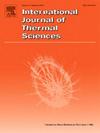Experimental investigation of the effects of current and voltage on the thermal characteristics of low-voltage DC fault arc
IF 5
2区 工程技术
Q1 ENGINEERING, MECHANICAL
International Journal of Thermal Sciences
Pub Date : 2025-07-01
DOI:10.1016/j.ijthermalsci.2025.110122
引用次数: 0
Abstract
Fault arc is one of the potential causes of electrical fires. To predict the thermal characteristics of long-duration fault arcs in low-voltage DC systems, this study conducted a series of fault arc experiments under different initial current and power supply voltage conditions. The results indicate that the arc ignition process for the copper-copper electrodes follows the sequence: break arc, arc heating electrode, electrode melting, and arc extinction. The melting and dripping speed of the copper electrode tip is influenced by arc power, and in some high-power arc cases, heat transfer to the electrode does not reach a stable state before arc extinction, thus the electrode temperature does not always scale with arc power. By analyzing the arc power and arc duration based on the volt-ampere characteristics of the arc and its heat transfer characteristics to the electrodes, it was found that while an increase in initial current and power supply voltage enhances arc power, it also accelerates electrode consumption, thereby shortening the arc duration. The combined application of the arc power model and arc duration model established in this study enables effective prediction of arc energy. The research findings provide guidance for fault arc prevention in low-voltage DC electrical systems.
电流和电压对低压直流故障电弧热特性影响的实验研究
故障电弧是电气火灾的潜在原因之一。为了预测低压直流系统中长时间故障电弧的热特性,本研究在不同初始电流和电源电压条件下进行了一系列故障电弧实验。结果表明:铜-铜电极的引弧过程依次为断弧→电弧加热→电极熔化→灭弧。铜电极尖端的熔化和滴速受电弧功率的影响,在某些大功率电弧情况下,电极的传热在灭弧前并没有达到稳定状态,因此电极温度并不总是随电弧功率的变化而变化。根据电弧的伏安特性及其对电极的传热特性,分析电弧功率和电弧持续时间,发现初始电流和电源电压的增大在增大电弧功率的同时,也会加速电极的消耗,从而缩短电弧持续时间。将本文建立的电弧功率模型与电弧持续时间模型相结合,可以有效地预测电弧能量。研究结果对低压直流电气系统的故障防弧具有指导意义。
本文章由计算机程序翻译,如有差异,请以英文原文为准。
求助全文
约1分钟内获得全文
求助全文
来源期刊

International Journal of Thermal Sciences
工程技术-工程:机械
CiteScore
8.10
自引率
11.10%
发文量
531
审稿时长
55 days
期刊介绍:
The International Journal of Thermal Sciences is a journal devoted to the publication of fundamental studies on the physics of transfer processes in general, with an emphasis on thermal aspects and also applied research on various processes, energy systems and the environment. Articles are published in English and French, and are subject to peer review.
The fundamental subjects considered within the scope of the journal are:
* Heat and relevant mass transfer at all scales (nano, micro and macro) and in all types of material (heterogeneous, composites, biological,...) and fluid flow
* Forced, natural or mixed convection in reactive or non-reactive media
* Single or multi–phase fluid flow with or without phase change
* Near–and far–field radiative heat transfer
* Combined modes of heat transfer in complex systems (for example, plasmas, biological, geological,...)
* Multiscale modelling
The applied research topics include:
* Heat exchangers, heat pipes, cooling processes
* Transport phenomena taking place in industrial processes (chemical, food and agricultural, metallurgical, space and aeronautical, automobile industries)
* Nano–and micro–technology for energy, space, biosystems and devices
* Heat transport analysis in advanced systems
* Impact of energy–related processes on environment, and emerging energy systems
The study of thermophysical properties of materials and fluids, thermal measurement techniques, inverse methods, and the developments of experimental methods are within the scope of the International Journal of Thermal Sciences which also covers the modelling, and numerical methods applied to thermal transfer.
 求助内容:
求助内容: 应助结果提醒方式:
应助结果提醒方式:


